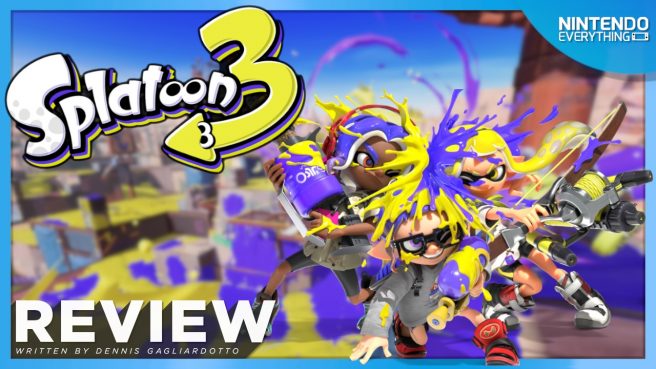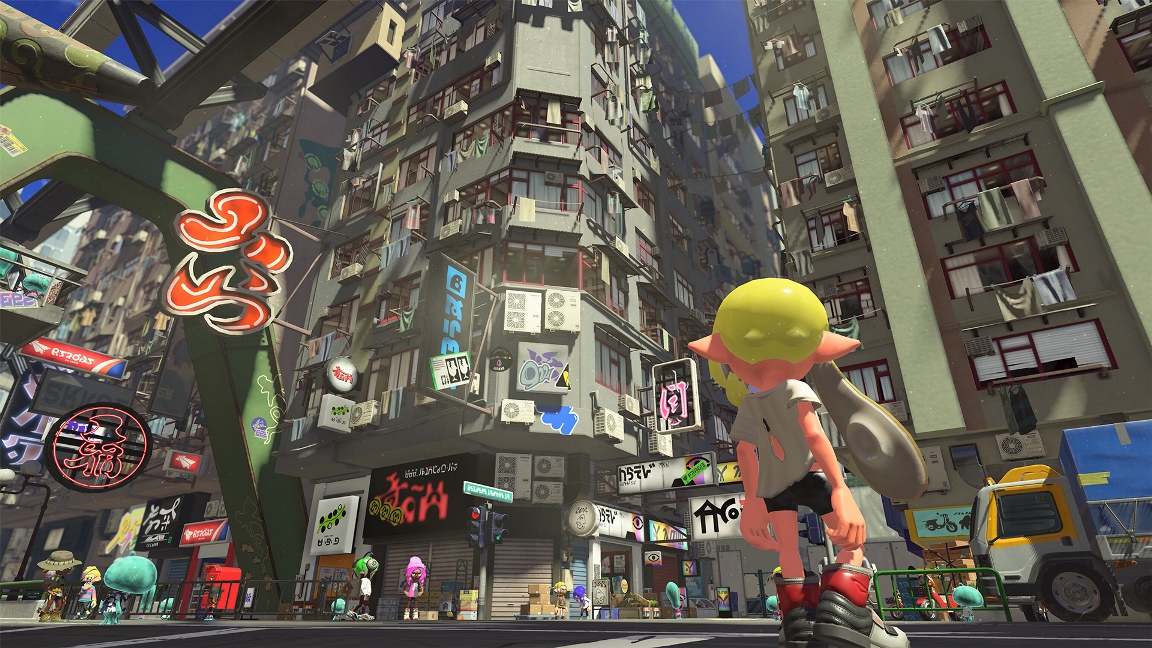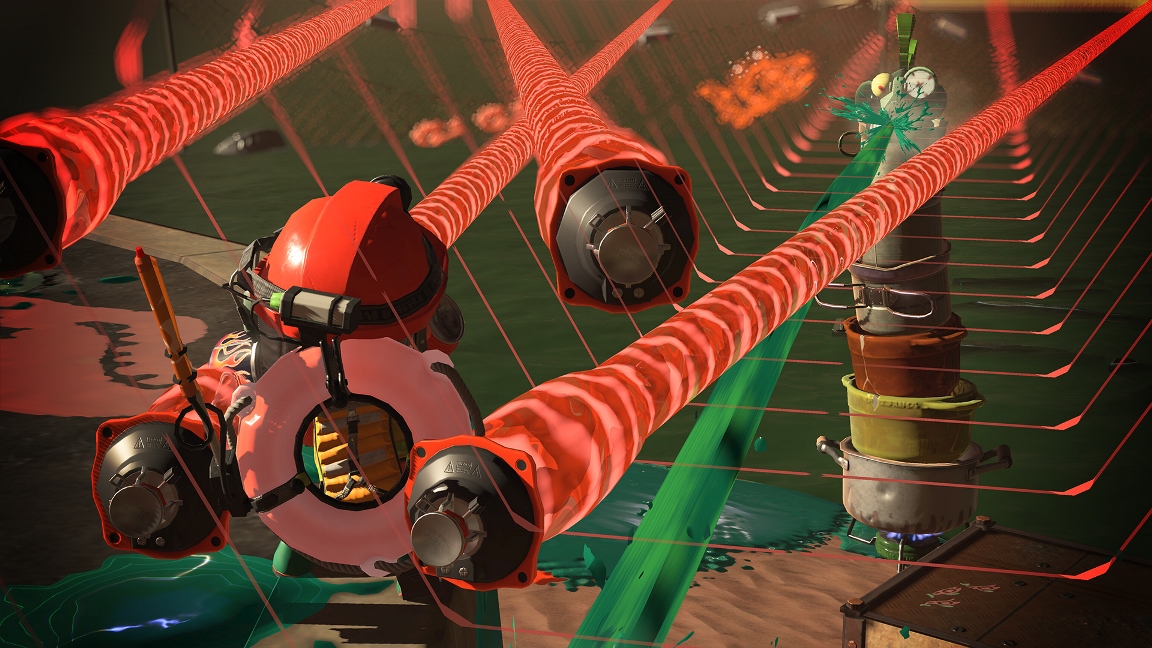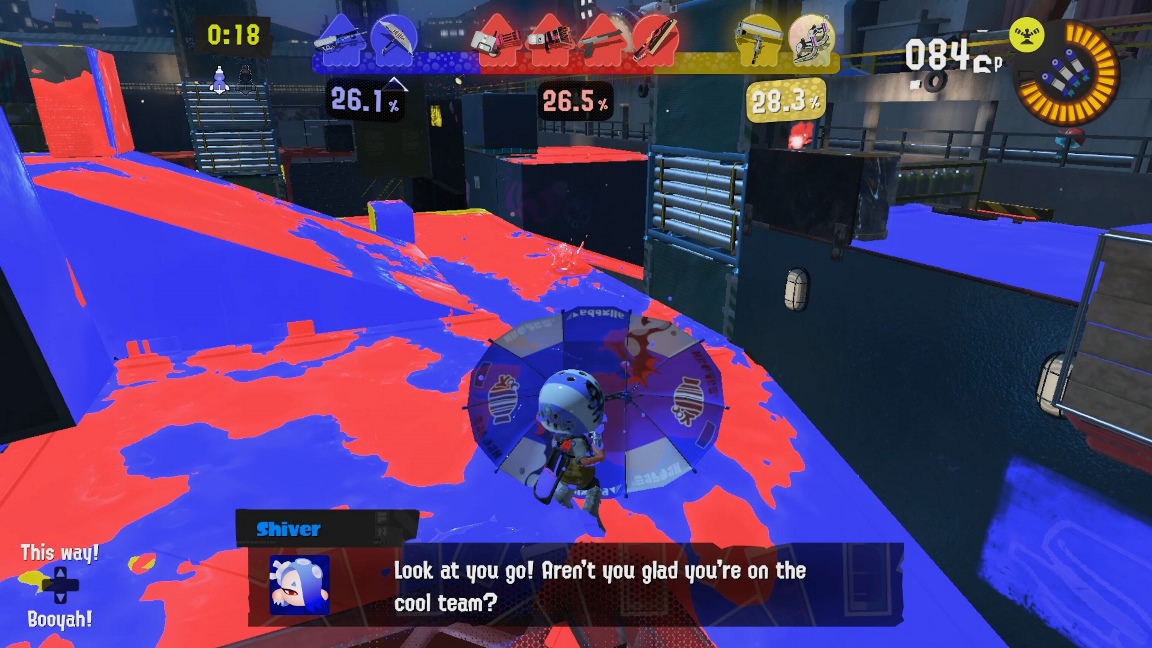[Review] Splatoon 3
System: Switch
Release Date: September 9, 2022
Developer: Nintendo
Publisher: Nintendo
It’s hard to believe that such a fresh property like Splatoon has already been around for seven years, but Nintendo’s IP that introduced the cute little humanoid squids known as Inklings quickly resonated with fans despite being on the commercial failure that was the Wii U. It was when Splatoon 2 took off, however, that the franchise truly found its following thanks to the Switch’s success. Interestingly, the quick turnaround rate of two years for Splatoon 2 to release made the game feel almost too familiar. But to the uninitiated, Splatoon 2 gave those same feelings that Splatoon 1 did to those that owned a Wii U. Meanwhile, Splatoon 3 had a chance to marinate for years – five years to be exact – and has seen vast improvements to the overall structure of the game and its heavily-focused online portion that doesn’t feel anywhere near as dated, bringing the game and its multiplayer inking glory to the modern day while looking as beautiful as ever.
Splatoon 3 will feel both familiar and new to returning players, but one of the most exciting factors is how much it’s overhauled the basic functionalities of how the core game functions on both a mechanical and user level. So many quality-of-life features have been introduced that fans have been asking for since the first title, and it’s really made the entire experience feel seamless and comfortable.
One of its biggest highlights is the single-player story mode that actually feels properly fleshed out this time around. Before it felt like a glorified version of a level advancement system in which once you were completed with one, you’d walk in a straight line before jumping into the next one and more or less doing the same kind of stages again (not including the Octo Expansion), but Splatoon 3 does a lot more with its campaign and feeling like another hub for players to run around in. Though the story is yet another uninspired take on the “war against Octarians”, the levels themselves have been vastly improved, providing a much more robust and eclectic offering that feels like mini-games that have been reworked and expanded to become full-fledged stages of their own.
Each stage will have certain requirements, like which weapons to use (if any), a timer (if any), and a designated objective. These particular stages always feel rewarding and promote a high amount of replay value, which is great as there’s not really a post-game to speak of in Splatoon 3 as you’re likely to spend all your time in Turf Wars anyways after its campaign. With six sites and plenty of levels and bosses within each, the story mode can feel however long or short you want it to be as you will only need to complete a certain amount of levels within each before moving on, but most will likely feel inclined to take advantage of all the great content the game has this time around, as gathering power eggs and collectibles to upgrade your stats that are displayed like a skill-tree can be highly rewarding and worth the time. By the end of Splatoon 3’s campaign, its wacky adventure is without a doubt the series’ most fun and inventive yet, and every single boss – as has been with the series’ history – is handled so creatively you can’t help but appreciate the amount of work that went into the design of each.
All of what makes Splatoon great and identifiable is still here, from its 4v4 Turf Wars to Salmon Run, its plethora of shops to give players the freshest outfits to play with, new and returning weapons, and of course its largest hub yet. Splatoon 3 gives a sense of scale and growth that is seen from the moment the tutorial has finished when players find themselves in Splatsville shortly after they’ve customized their Inkling or Octoling and Smallfry to their liking. Though it may seem overwhelming at first, the hub is still fairly centered and focused around its shops which are all accessible through the main menu as well for quick access.
I’ll admit it’s slightly unfortunate that while Splatoon 3’s hub is far more detailed and fun to look around, the appeal is lost fairly quickly as it’s all window dressing especially since you only see snapshots of current looks of various players and AI walking around. Even so, it’s fun to walk around and take in the sights, especially with its new but sorely lacking photo mode. It’s little things like these that I always look forward to in any hub, and while there’s certainly movement and the added visuals of some of the most impressive (but equally hilarious) posts from players on walls, billboards, and the like, the hub still feels like it’s slightly frozen in time. Even so, it’s a vast improvement from its predecessors as they don’t feel nearly as cramped and uninspired, and Splatoon 3 easily has its most beautiful and compelling hub yet all things considered.
With the return of the obvious gameplay formats that make Splatoon what it is like its Turf Wars, Anarchy Battles have also represented a new look for what Ranked Battles are with both Open and Series modes. While it is effectively a sort of “redesign” of what Ranked is, putting a more casual and approachable spin on it, the five-minute matches are perfect for players that want to squeeze out a little more from Splatoon and play in a more strategic fashion. However, this is typically done with other random players on a team instead of friends.
For those looking for less competitive gameplay, Splatoon 3 of course has the basic Turf Wars that is the driving force of the series in which players ink as much as possible with their respective colors before the timer runs out, with a winner being decided upon which team has covered the most of the map. Nothing is substantially different here, but being able to immediately choose a spot to land on rather than spawning already on the ground makes the game much more enjoyable as one can choose an immediate starting position, with of course the added layer of being able to jump directly to a teammate’s position to get directly into the battle.
For the first time in the series, Tricolor Turf Wars introduces a third team into the mix, but the rules are more or less the same until about half-time in which placements will change and the first-place team has to eventually defend the Ultra Signal before the Sprinkler of Doom is dropped onto the field, causing for absolute mayhem to whoever gets ahold of it. While these won’t appear until the second half of an ongoing Splatfest, the frenetic nature of the mode certainly adds a refreshing new take on Turf Wars and one that I wish was a bit more permanent.
Splatoon 3 does a lot more in the customization department this time around to give a more personalized feel and look for players, which is heavily appreciated when there was a huge lack of identity before with everyone having to be Inklings and getting the same outfits depending on what the “meta” called for. Now with over 100 pieces of clothing, Splashtags, collectable cards for Tableturf Wars, and lockers – not to mention the few ways to customize the Inkling and Octoling to your liking at the start of the game – Splatoon 3 has that panache and finesse that feels more in line with a contemporary multiplayer game where players can show off their favorite looks and have that sense of identity for themselves and what best represents them. The lockers especially have a big amount of fun attached to them, being able to decorate and style them however you please and showing them off to your friends and the rest of the world in the locker room, showcasing a variety of possessions that bring about personality from player to player.
Although Splatoon 3 still certainly feels like more Splatoon, improvements have been made where they matter most, and it’s done so in a way that gives the series its most comfortable setting yet and allows for both schedules short on time and with time to kill to play however they want. In an odd way, these refinements have been made well enough that Splatoon 3 feels addictive to a degree, and it brings back that great feeling I had when playing Splatoon 1 that I feel was missed in Splatoon 2. While on the surface it may not seem like much has changed, Splatoon 3 is one of those games you’re better off experiencing for yourself to truly appreciate all of the improvements that have been done to maximize the player enjoyment, and though there is still room for improvement in many areas of the game, it’s a step in the right direction.
The Verdict

Splatoon 3, for all its worth, is still very much Splatoon, and this is a good thing as it’s what’s allowed the series to have an identity of its own and yet to be replicated all of these years later. With new maps, a much more robust single-player experience, and finally a logical online infrastructure with quality-of-life features that have been the norm elsewhere for over a decade now, Splatoon 3 is the most accessible, fun, and wacky entry so far. The title feels fresh and new in all the areas that count while remaining familiar in the core foundation of its gameplay to provide an easy pick-me-up for newcomers and veterans alike.
Splatoon 3 copy provided by the publisher for the purposes of this review.



